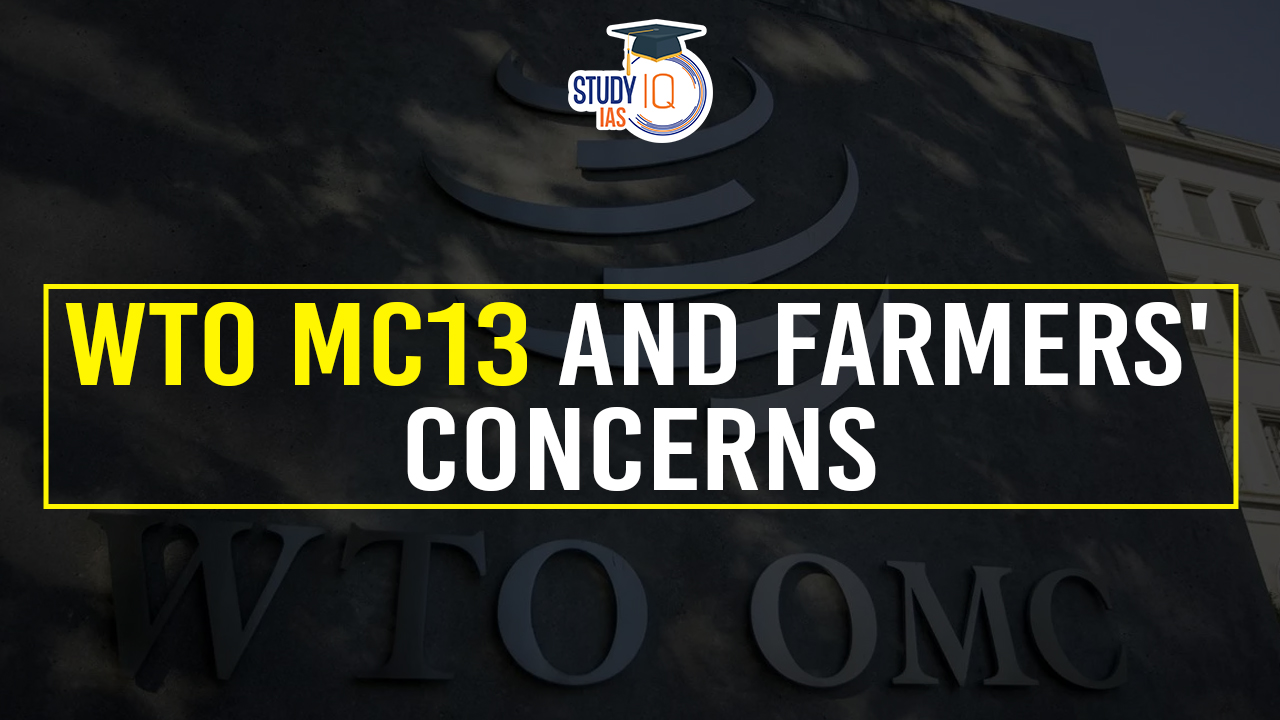Table of Contents
Context: Indian farmers called for India to withdraw from the World Trade Organization (WTO) during a tractor rally. Samyukta Kisan Morcha (SKM) named this event “Quit WTO Day.”
What are the Concerns of the Farmers?
- Price Support Limitations: WTO restrictions on national price support levels are seen as detrimental to farmers’ income and agriculture’s sustainability.
- Food Sovereignty at Risk: WTO policies are perceived as threatening India’s ability to ensure affordable food access due to reliance on government initiatives like minimum support prices and public food distribution.
- Insufficient Farmer Protections: The WTO framework is seen as lacking safeguards for farmers’ well-being, prioritising trade liberalisation over potential harm to the agricultural sector.
- Dissatisfaction with “de minimis” Limits: The WTO’s Agreement on Agriculture sets unfair thresholds for domestic support compared to those granted to developed nations.
- Recent Economic Difficulties: Declining farm income due to export restrictions and climate change has intensified existing concerns, highlighting the need for stronger policies and safeguards for farmers’ economic security.
About WTO 13th Ministerial Conference (MC13)
- Duration: 26th-29th February.
- Participants: Trade ministers of 164 member countries.
- Location: Abu Dhabi, United Arab Emirates.
- Purpose: To discuss the backdrop of the uncertain global economic situation due to the Red Sea crisis, the Ukraine-Russia war and the Israel-Hamas conflict.
| Important Fact |
| At MC13, WTO members will have for the first time dedicated discussions on sustainable development. |
We’re now on WhatsApp. Click to Join
Key Areas on India’s Agenda at the WTO’s 13th Ministerial Conference
- Food Security: India seeks a permanent solution from the WTO for its Public Stockholding (PSH) program, crucial for food distribution and ensuring food security for over 800 million people.
- India opposes the current WTO limit on food subsidy bills and suggests amendments to the calculation formula.
- Joint Support Initiatives (JSIs): India opposes proposals like the China-led investment facilitation agreement, arguing that such initiatives fall outside the WTO’s mandate and could negatively impact developing nations.
- Agricultural reforms: India advocates for protecting farmer livelihoods and fair market access, opposing pressure from developed nations to reduce domestic support and increase market openness despite their own high farm subsidies.
- WTO Reforms: India supports reforms that consider developing countries’ interests and maintain key pillars like special treatment, equal voice, and dispute settlement mechanism.
- India seeks a revamped Appellate Body to ensure fairness but opposes the US’s resistance and the EU’s alternative proposals.
- Fisheries subsidies: India champions a balanced approach considering “common but differentiated responsibilities,” advocating for:
- Allowing developing countries to subsidise fishing within their exclusive economic zones (EEZs).
- Ending subsidies by developed nations for fishing beyond EEZs for the next 25 years.
- E-commerce moratorium: India, alongside other developing nations, seeks to end the current moratorium on customs duties for electronic transmissions and establish regulations for e-commerce trade.
- Trade barriers: India reiterates its stance against including non-trade issues like labor, environment, and women’s economic empowerment in WTO discussions.
- India opposes trade barriers like the EU’s carbon tax and deforestation regulation, arguing that such issues belong to other multilateral forums.


 Serious Fraud Investigation Office (SFIO...
Serious Fraud Investigation Office (SFIO...
 Article 142 of Indian Constitution, Sign...
Article 142 of Indian Constitution, Sign...
 Pakistan-Occupied Kashmir (PoK): History...
Pakistan-Occupied Kashmir (PoK): History...





















